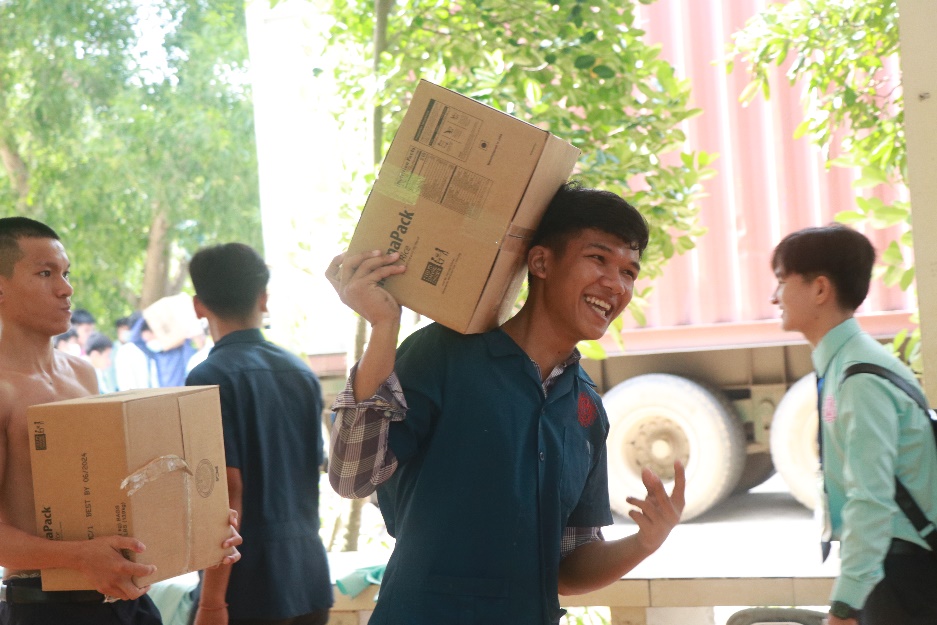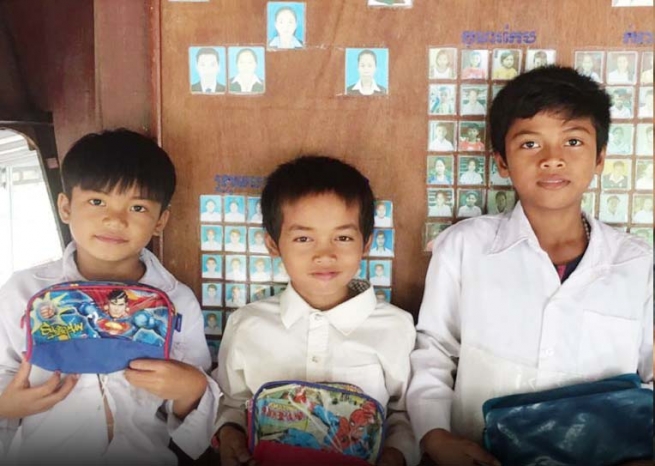UNICEF: Nutrition Campaign Helps Make Cambodia’s Children Strong, Healthy and Clever
(UNICEF) It is 8:00 a.m. in Ponleak village, Kampong Thom, and the sun is already high in the sky. A line of oxen amble down the dry dirt road past Vath Ngim’s house on stilts.
Ngim and her neighbor Roeun Heourn sit on a large wood-slatted bed in the shade beneath her home, chatting and laughing, chopping ingredients with Ngim’s aunt for their babies’ morning meal. They are making Bobor Khab Krub Kroeung, a thick rice porridge made with vegetables and oil and meat, fish or eggs.
Risk of malnutrition
A 2010 survey showed that only 24 percent of Cambodian children aged between 6 and 23 months are appropriately fed. Without enough food, and without a variety of complementary foods with the right micronutrients, children are at risk of malnutrition, which can have a permanent impact on their physical and cognitive development.
More than one quarter of Cambodian children under 5 years old are underweight, and four out of every 10 are short for their age.
Promoting complementary feeding
In April 2012, UNICEF, with funding from the United States Agency for International Development and in partnership with the Royal Government of Cambodia Ministry of Health, National Center for Health Promotion, the National Nutrition Program, the World Health Organization, the Reproductive and Child Health Alliance and Helen Keller International, launched a communication campaign to promote complementary feeding in Cambodia to change the way caregivers feed their children in order to improve child nutrition.
The campaign’s main objective is for caregivers to cook Bobor Khab Krub Kroeung for children aged between 6 and 24 months and ensure that they provide this food hygienically, with appropriate frequency and in the right quantity, while interacting with their babies during feeding.
Putting message into practice
Ngim and Heourn and their babies have benefitted from the campaign. Both women breastfeed their children and complement the breast milk with the porridge. Heourn says she makes the porridge for her baby every day, but Ngim admits that, sometimes, when she’s very busy, she may miss a day of making it for 13-month-old Chanreah. “Occasionally, when my mother is away, [Chanreah] gets rice and water – but he looks unhappy and he doesn’t like it.”
As water boils for rice on a clay stove in the open air, Ngim talks about how she first learned about Bobor Khab Krub Kroeung. “I heard about it from my mother, who is a health volunteer. She took me to see the food cooking demonstration at the [Buddhist temple].”
Heourn, who is mashing pre-boiled pumpkin to add to the pot, says she also saw the food demonstrations and heard about Bobor Khab Krub Kroeung on television and radio. ”The radio [messages] explained that it can make children strong, healthy and clever, and build the body to protect it from being sick. It is different to the porridge we used to give babies with just rice, water and salt. I remember from the TV that we have to give them green vegetables, yellow vegetables, meat, fish, eggs and oil, and it showed us how to cook them,” she says.
Heourn completes the cooking by folding eggs, greens and oil into the bubbling porridge. She takes another small spoon, tastes the food and nods with satisfaction. The mothers then ladle the mixture into small bowls to cool, before serving it to their babies.
Mealtime is not just about feeding. As the mothers have learned through the campaign, it is also an opportunity to talk and play with their babies. Ngim and Heourn use toy cars and rattles to make the children laugh between mouthfuls of food. “I feed him and play, and I don’t force him, but Bobor Khab Krub Kroeung has a good taste, and he likes it,” says Heourn.
Making a difference
Health volunteer Sim Sray passes by to see the mothers and their children. “Children are quite different from before,” she says. “Most used to be malnourished. Now, many are healthy…
“[W]e encourage families to start a house garden and grow vegetables to feed to their children,” she adds. “On my visits, I try to motivate the mothers to cook for their children. In the rainy season, there are many vegetables – but, when vegetables are hard to find in the dry season, I encourage them to cook together with each neighbor contributing something.”
###
See this article at its original location >
Article by Denise Shepherd-Johnson
Photo: © UNICEF Cambodia/2013/Khoy




